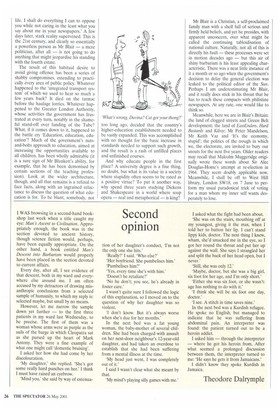Second opinion
I WAS browsing in a second-hand bookshop last week when a title caught my eye: Man's Ascent to Civilisation. Appropriately enough, the book was in the section devoted to ancient history, though science fiction would, perhaps, have been equally appropriate. On the other hand, a book entitled Man's Descent into Barbarism would properly have been placed in the section devoted to current affairs.
Every day, after all, I see evidence of that descent, both in my ward and everywhere else around me. I am often accused by my detractors of drawing misanthropic conclusions from a selected sample of humanity, to which my reply is: selected maybe, but small by no means.
However, let me narrow the sample down yet further — to the first three patients in my ward last Wednesday, to be precise. The first of them was a woman whose arms were as purple as the sails of the barge in which Cleopatra sat as she pursed up the heart of Mark Antony. They were a fine example of what one might call `domestic bruising'.
I asked her how she had come by her discolouration.
`My daughter,' she replied. `She's got some really hard punches on her.' I think I must have raised an eyebrow.
'Mind you,' she said by way of extenua tion of her daughter's conduct, `I'm not the only one she hits.'
`Really?' I said. `Who else?'
`Her boyfriend. She pumbelises him.' `Pumbelises him?'
`Yes, every time she's with him.' `Doesn't he retaliate?'
`No he don't; you see, he's already in foster care.'
I wasn't quite sure I followed the logic of this explanation, so I moved on to the question of why her daughter was so violent.
`I don't know. But it's always worse when she's due for her months.'
In the next bed was a fat young woman, the baby-mother of several children. She had been charged with assault on her next-door neighbour's 12-year-old daughter, and had taken an overdose to establish that she had been suffering from a mental illness at the time.
`My head just went, I was completely out of it.'
I said I wasn't clear what she meant by that.
`My mind's playing silly games with me.' I asked what the fight had been about.
`She was on the stairs, mouthing off at my youngest, giving it the max, when I told her to button her lip. I can't stand lippy kids, doctor. The next thing I knew, wham, she'd smacked me in the eye, so I got her round the throat and put her up against the wall. She says I strangled her and split the back of her head open, but I never.'
`Still, she was only 12.'
`Maybe, doctor, but she was a big girl, six foot for her age, and I'm only short.'
`Either she was six foot, or she wasn't: age has nothing to do with it.'
`I think she will be six foot one day, doctor.'
`I see. A stitch in time saves nine.'
In the next bed was a Kurdish refugee. He spoke no English, but managed to indicate that he was suffering from abdominal pain. An interpreter was found: the patient turned out to be a heroin addict.
I asked him — through the interpreter — where he got his heroin from. After what seemed a prolonged discussion between them, the interpreter turned to me: `He says he gets it from Jamaicans.'
I didn't know they spoke Kurdish in Jamaica.
Theodore Dalrymple


















































































 Previous page
Previous page